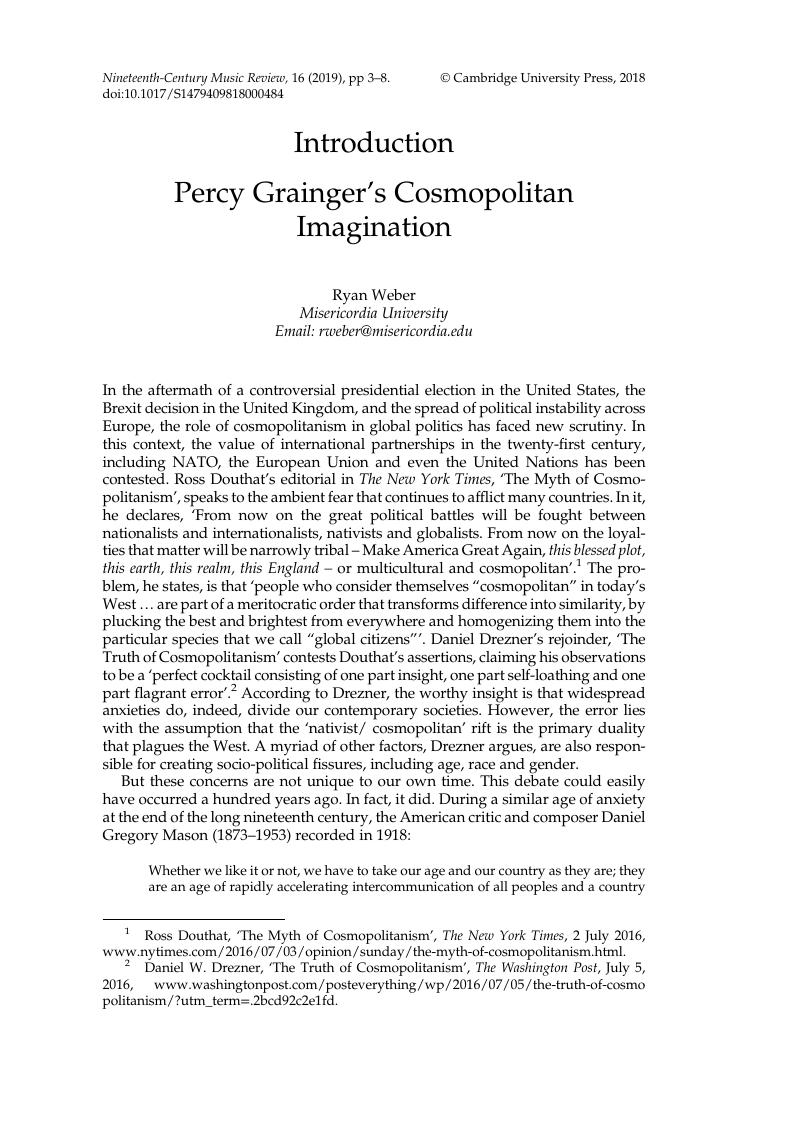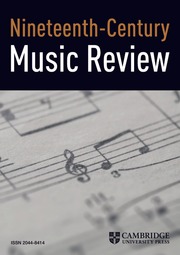No CrossRef data available.
Article contents
Percy Grainger’s Cosmopolitan Imagination
Published online by Cambridge University Press: 26 April 2019
Abstract

- Type
- Introduction
- Information
- Copyright
- © Cambridge University Press, 2019
References
1 Ross Douthat, ‘The Myth of Cosmopolitanism’, The New York Times, 2 July 2016, www.nytimes.com/2016/07/03/opinion/sunday/the-myth-of-cosmopolitanism.html.
2 Daniel W. Drezner, ‘The Truth of Cosmopolitanism’, The Washington Post, July 5, 2016, www.washingtonpost.com/posteverything/wp/2016/07/05/the-truth-of-cosmopolitanism/?utm_term=.2bcd92c2e1fd.
3 Gregory Mason, Daniel, ‘Folk-Song and American Music (A Plea for the Unpopular Point of View)’, The Musical Quarterly 4/3 (1918), 332 Google Scholar . See also my discussion of Mason’s article in this issue.
4 Grainger, ‘Modern and Universal Impulses in Music’, reprinted in Grainger on Music, ed. Malcolm Gillies and Bruce Clunies Ross (Oxford: Oxford University Press, 1999), 77–83.
5 See ‘The Value of Icelandic to an Anglo-Saxon’, 121–130, and ‘Grieg: Nationalist and Cosmopolitan’, 318–337, in Grainger on Music. Grainger also authored several essays during this period in which he uplifted the work of specific composers for their ability to forge a connection between the individual and the universal, including Richard Strauss, Igor Stravinsky, Natalie Curtis, Edvard Grieg, and others.
6 Rovisco, Maria and Nowicka, Magdalena, eds, The Ashgate Research Companion to Cosmopolitanism (Farnham: Ashgate, 2011)Google Scholar .
7 See especially, Collins, Sarah and Gooley, Dana, ‘Music and the New Cosmopolitanism: Problems and Possibilities’, The Musical Quarterly 99/2 (2016), 139–165 CrossRefGoogle Scholar . Their review of recent literature on cosmopolitanism is replete and requires no further repetition in this current issue. Of particular note also is Daniel Grimley’s article, ‘Vers un cosmopolitisme nordique: Space, Place, and the Case of Sibelius’s “Nordic Orientalism”’, 230–53. His analysis of the ‘darker side’ of cosmopolitanism is also applicable to Grainger’s career as it contributes to the frequently under-studied consequences of patterns of reception.
8 Hughes, Charles W., ‘Percy Grainger, Cosmopolitan Composer’, The Musical Quarterly 23/2 (1937), 136 Google Scholar . See also the discussions of this article by Malcolm Gillies and Peter Tregear in this issue.
9 Robinson, Suzanne and Dreyfus, Kay, eds, Grainger the Modernist (Farnham: Ashgate, 2015)Google Scholar .
10 See Anderson, Amanda, The Powers of Distance: Cosmopolitanism and the Cultivation of Detachment (Princeton: Princeton University Press, 2001)Google Scholar .
11 For a discussion of similar case studies, see Malachuk, Daniel S., ‘Nationalist Cosmopolitics in the Nineteenth Century’ in Cosmopolitics and the Emergence of a Future, ed. Diane Morgan and Gary Banham (New York: Palgrave Macmillan, 2007), 139–162 CrossRefGoogle Scholar . See also the discussion of this article in Collins and Gooley, ‘Music and the New Cosmopolitanism’, 139–65, wherein they elucidate the problem of finding a binding agent that I allude to here.
12 Delanty, Gerard, The Cosmopolitan Imagination: The Renewal of Critical Social Theory (Cambridge: Cambridge University Press, 2009), 16 Google Scholar .
13 While this period of Grainger’s thinking is beyond the scope of this issue, see also Gillies, Malcolm and Pear, David, ‘Percy Grainger and American Nordicism’ in Western Music and Race, ed. Julie Brown (Oxford: Oxford University Press, 2007), 115–124 Google Scholar .
14 For an overview of Grainger’s significant departure from national-Romantic agendas when it comes to the handling of English folk-song, see Freeman, Graham, ‘“It Wants all the Creases Ironing Out”: Percy Grainer, The Folk Song Society, And the Ideology of the Archive’, Music & Letters 92/3 (2011), 410–436 Google Scholar .
15 Andy Fry, ‘Rethinking the Revue Nègre: Black Musical Theatre in Inter-war Paris’ in Western Music and Race, 258–275.
16 This process represented an inversion of many nationalist agendas by which certain ethnic ‘minorities’ were repressed. Instead, Grainger’s efforts throughout the latter part of the twentieth century became focused on freeing those (Nordic) cultures that resided outside the grasp of the hegemonic powers and reviving their relevance on the world stage – a practice common to certain strains of eugenics. Though this chapter of Grainger’s career is beyond the immediate scope of this issue, see Bashford, Alison, ‘Internationalism, Cosmopolitanism, and Eugenics’, in The Oxford Handbook of the History of Eugenics, ed. Alison Bashford and Philippa Levine (Oxford: Oxford University Press, 2010), 154–172 Google Scholar . For an applicable discussion of the role of eugenics in shaping modernism, see Philippa Levine’s article in the same volume, ‘Anthropology, Colonialism, and Eugenics’, 43–61.




